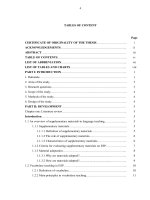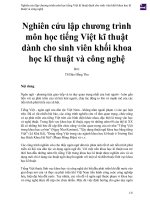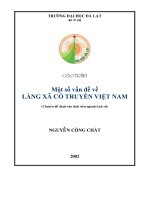Tiếng anh chuyên nghành dành cho sinh viên nông học
Bạn đang xem bản rút gọn của tài liệu. Xem và tải ngay bản đầy đủ của tài liệu tại đây (29.58 KB, 4 trang )
1.
* Question a: What is the root system and its functions?
- Root system is a basic part of plant. It is below the ground.
- Root system has 2 functions. Firstly it takes in water and mineral from the soil. secondy, it holds the
plant in the soil.
* Question b: What are root hairs?
- The root hairs are single cells near the tip of root.
* Question c: What do sugar beets, carrots and leguminous plants have in their roots ?
- Sugar beets and carrots have food in their roots.
- Legunies have spesial bacteria on their roots.
2.
* Question a: What is the shoot system?
- Shoot system is a basic part of a plant. lt is above the ground.
* Question b: What are the functions of the stem, the leaves, flowers and fruit?
- Shoot system has 4 parts: stem, leaves, flowers, and fruit
- Stem: has 2 functions. Firstly, it supports the plant. Secondly, it helps water and mineral to move
from the root to leaves and flowers.
- Leaves: make food for the plant through photosynthesis.
- Flower has reproductive organs of the plant.
- Fruit has the seeds and protects them while they are developing.
3.
* Question a: What is germination?
- Germination is the first stage of the life cycle of a plant.
* Question b: What are the necessary conditions for germinations ?
- There are 4 conditions right.
+ Firstly, the seeds must be alive.
+ Secondly, the temperature must be right. If the temperature is too high, the seeds will die because
water conten is reduced and some proteins are destroyed.
+ Thirdly, the moisture must be right. If the soil is too dry, the seeds will not germinate until it rains.
+ Fourthly, the amount of oxygen must be enough.
4.
* Question a: What happens in the first stage of germination?
- Firstly, the primary roots emerge. Then, the stem grows upward, above the surface of the soil. At
the same time, the root system grows downward and spread through the soil.
- Next, leaves are produced and photosynthesis begins.
* Question b: What happens in the stage of rapid growth? Plant begins to grow to its full size. Then, it
flowers. At that time, pollination and fertilization begin to happen.
5.
* Question a: What is light quantity?
- Light quantity is the intensity of sunlight and changes with the season. The maximum is in the
summer and the minimum in winter.
* Question b: How can light quantity be decreased and increased?
- Light quantity can be decreased in a garden or green by using shade-cloth above the plants
- Light quantity can be increased by using white material or supplemental.
6.
* Question a: What is light quality?
- Light quality is the color or wavelength reaching the plant.
- Light has 7 colors: red, orange, yellow, green, blue, indigo, and violet.
* Question b: How does red and blue light affect the plant growth?
- Red and blue light have the greatest effect on plant growth.
+ Blue light is responsible for leaf growth.
+ Red light when combined with blue light promotes flowering in plants.
* Question e: How does green light effect the plant?
- Green light has the least effect on plant growth because most plants absorb very little green light.
7. How does high temperature effect plant growth? Exemple?
A. High temperture
- High temperture affect the productivity and growth of a plant.
+ Firstly, High temperture increased respiration sometime above the photosynthesis. This means
that the produce of photosynthesis are being used more rapidly than they are being produced. For
growth to occur, photosynthesis must be greater than respiration.
+ Secondly, hight temperature increases transpirations.
B. Exemple.
+ If temperatures are high and a length is long. cool season crops such as broccoli and spinach will bolt
rather than produce the desired flowers. And for warm-season crops such as pepper or tomato can
cause pollen to become inviable and not pollinate flowers.
8. How does low temperature effect plant growth? Exemple?
- Low temperture affect the productivity and growth of a plant.
- Low temperatures decrease photosynthesis. When the photosynthesis decrease plant grow is poor.
- If low temperatures are too low during the winter entire plant are killed because plant cell and tissue
freezing
9. What is the affects of wt.
* Water has 6 effect to growth of plant.
+ Firstly, Water is a primary component of photosynthesis.
+ Secondly, It maintains the turgor pressure of tissue and transports nutrients throughout the plant.
+ Thirdly, Water regulates the opening and closing of the stomata, thus regulating transpiration.
+ Forthly, Water solvent for minerals moving into the plant.
+ Fifthly, Water also provides the pressure to move a root through the soil.
+ Finally, Water stabilizes plant temperature.
10.
* Question a: Where are 16 essential nutrient elements from?
- Plants need 16 essential mutrienl elements for their growth: Carbon, hydrogen, and oxygen are
from the air and soil water. 13 essential elements: boron, iron, nitrogen, phosphorus, potassium,
calcium, magnesium, zinc, manganese, copper, molybdenum, sulfur, and chlorine are from soil minerals
or from organic and inorganic fertilizers.
* Question b: What are the factors that affect the amount of nutrient absorption?
- The factors that affect the amount of nutrient absorption ar the type of ion, soil pH, solubility of
ion pair, water, soil oxygen, sugar supply, plant stress, and temperature.
11.
* Question a: What are the fertilizers?
- Fertilizers are concentrated, inorganic material.
* Question b: Why are they added to the soil?
- There are 3 main kinds of fertilizers.
+ First, nitrogenous fertilizers, nitrogenous promotes leaf growth and give plants a heathy green
colour.
+ Secondly, phosphorus fertifizers, phosphorus fertilizers helps to form roots, and promotes fruit
and seed production.
+ Thirdly, potassium fertilizer. Potassic fertilizer makes the plant tissues stronger. This helps the
plant so withstand damage: for example, broken branches.
12.
* Question an: What are manures?
- Manures are bulky, organic materials
* Question b: why are they added to the soil?
- There are 2 kinds of manures: Farmyard manure and Green manure.
+ Farmyard manure is added to the soil for 3 reasons. Firstly, it improves the physical condition of
the soil. Secondly, it keeps the level of humus in the soil. Thirdly, it makes up for the plant nutrients
which have been lost by soil erosion.
+ Green manure includes legumes; for example, clover and lucener. Green manure supplies nitrogen
and organic matte.









